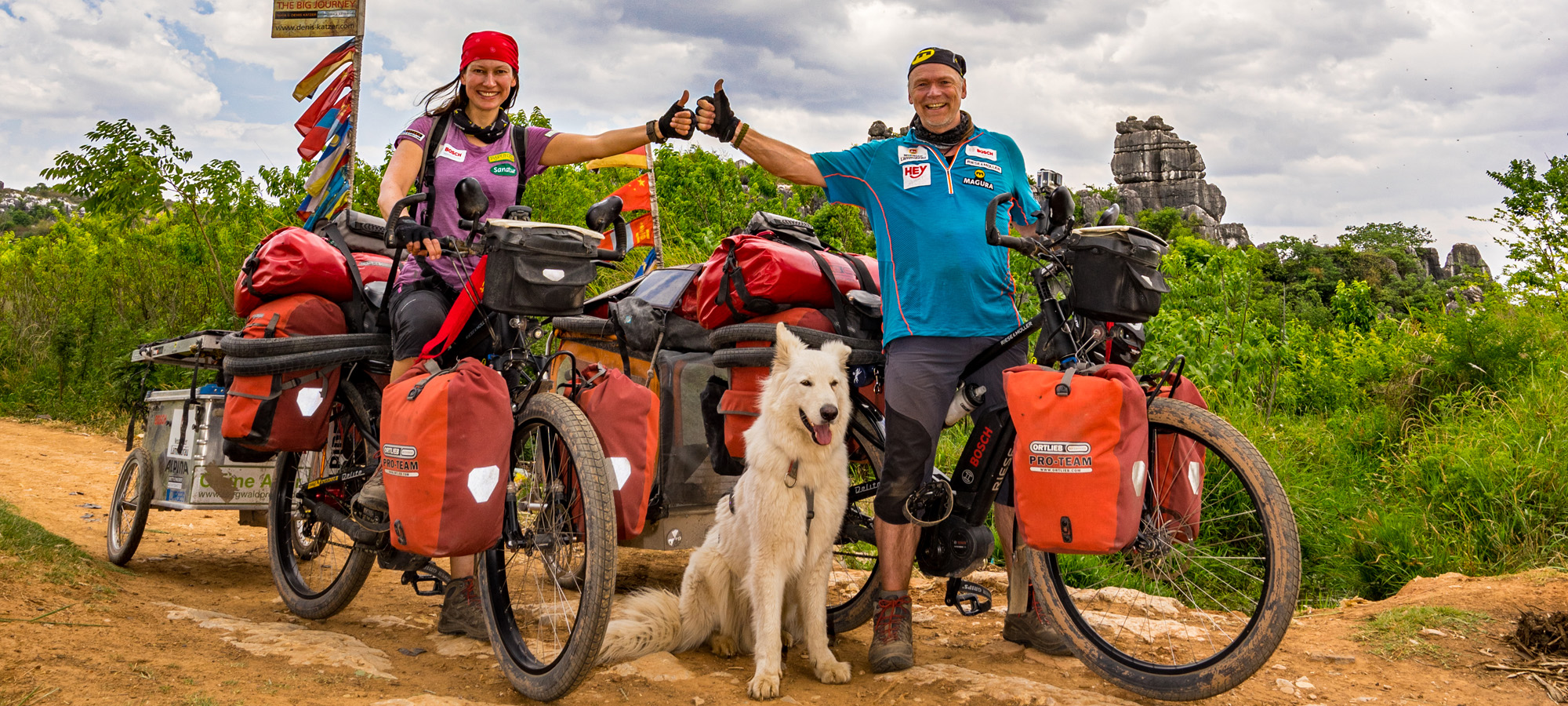
Extreme east wind
N 46°05'04.4'' E 038°58'07.6We leave the city under an absolutely blue sky. The course of the road leads us to the bypass around Timashevsk. Then it always goes straight ahead. The wind has been a nuisance for a long time. Today, however, it is extreme. It blows directly into our right side. We struggle to keep the wheels straight and have to concentrate very hard not to be pushed into one of the passing trucks or cars by a gust of wind. As the wind comes directly from the east, we see it as a greeting from Siberia. These are probably the harbingers of the cold winter easterly winds that are creeping over the Urals. We have to keep heading north for the next 200 kilometers to the city of Rostov-Na-Donu. From there, however, the route tends to head north-east.
Towards midday, the crosswind increases to such an extent that we reach the limits of what is humanly possible. Sometimes it gets caught in the frame of our bike and makes a complaining sound. This is exactly when we have to lean against it with our entire body weight to avoid being thrown onto the tar. Suddenly, seconds later, the gust eases a little, which is why we almost shoot into the ditch. We are shaken like in a washing machine. Back and forth, back and forth. Suddenly, one of the gusts of wind catches the front tire. The whimpering thigh muscles only manage to propel our bike six to eight kilometers per hour with all their strength. It’s exasperating and a real test of our stamina and morale. Our knees and backs start to ache. It is still 800 kilometers from here to our next major stage destination, the city of Volgograd, and at least 1,200 kilometers to our eventual stage destination, the city of Saratov. If the wind situation stays like this or even gets stronger, these destinations will soon be out of reach. We have also been warned of heavy rain which, according to the weather forecast, is due to start in four days’ time. We will see how the weather situation develops in the coming days. We have no choice but to accept it, keep pedaling and possibly look for alternatives.
We had actually planned to cover at least 80 kilometers on this beautiful, sunny day, but this unforeseen challenge forces us to rethink. “I see Kanesvskaya on the map. Maybe we can find a gastinitsa there?” I shout into the wind so that Tanja understands me. “Would be good”, I hear.
At 15:10, after 58 kilometers, we reach the town sign of Kanesvskaya. In the lee of the buildings and trees, we have to cycle another five kilometers into the center as the villages in this area often drag on forever. Three boys on their skateboards show us the way to a completely run-down gastiniza. “How much does a room cost?” I want to know. “Where do they come from?” is the answer. When I ask if the price has anything to do with our origin, I get no answer. Then I can have a look at the 400-ruble room. My God. I think to myself at the sight of the half-ruined rooms. Mold, worn beds, drafty windows, broken toilets that were constantly running and a musty smell. That’s too much even for me. “Don’t they have a better room?” I want to know. “Njet,” replies the friendly lady and picks up the phone to call another Gastiniza. Then she hangs up again and selflessly explains the way to a hopefully decent place to stay. Even though the tap water there smells of rotten eggs, we are relieved to find a nice room. The equally nice lady at reception immediately wants our passports and asks for our registration. Oh dear, please don’t register, I think, because we have hardly any energy left for the next 30 kilometers to the next town. “Do you have a visa?” the woman asks again. “Of course we have one,” I reply. Relieved that we obviously don’t have to go to the authorities for a report, we hand in our passports. Everything is neatly copied. The passport, the visa, the entry slip and the stamp of the last registration. What’s with their annoying registration? Then we get a receipt with all our data. Pure surveillance. “It doesn’t feel good somehow. I hope we can get used to it,” I say to Tanja. “I hope so. But the most important thing is that we don’t have to go out there today to fight the wind. Maybe the squalls won’t be so strong tomorrow.” “Yes, maybe,” I reply and, grateful for the safe haven, sink into the comfortable chair, which for a change isn’t run-down.

